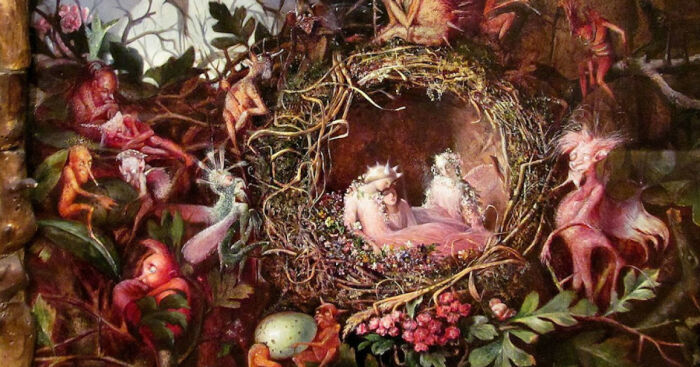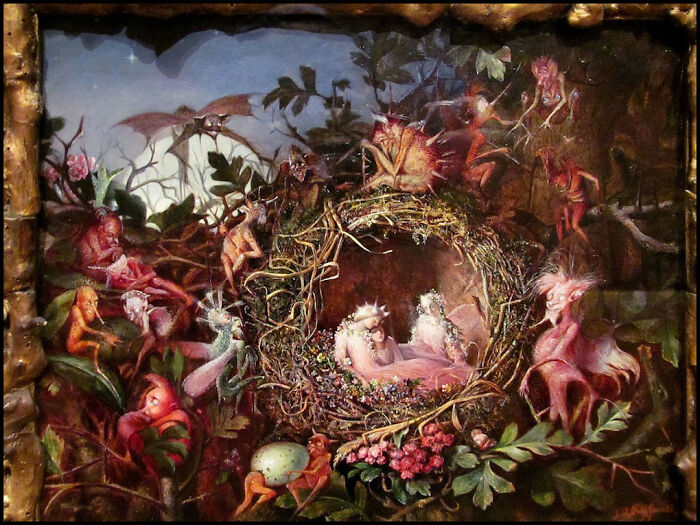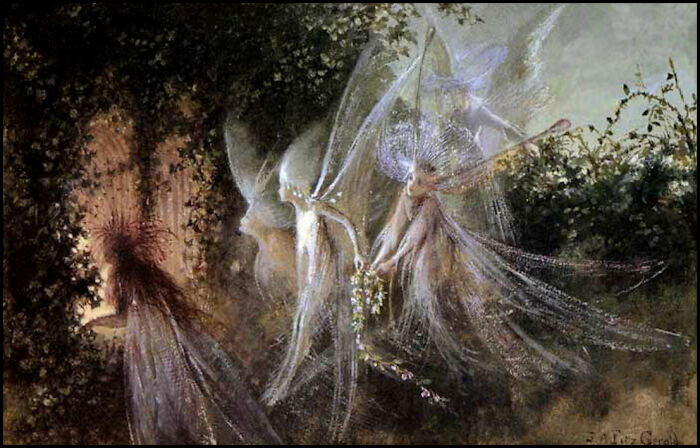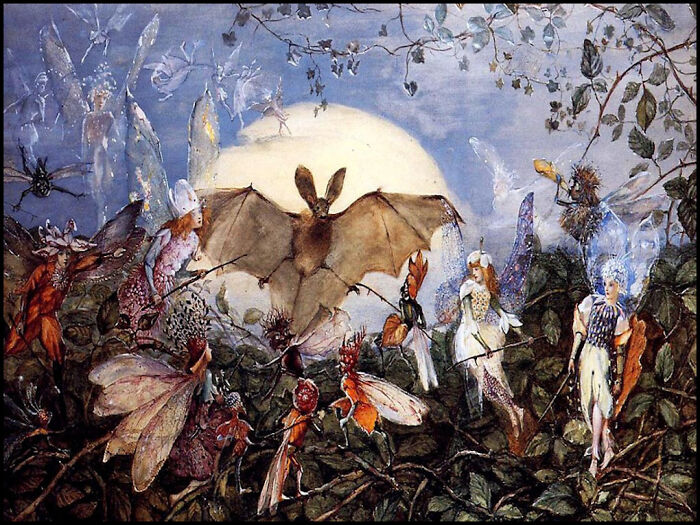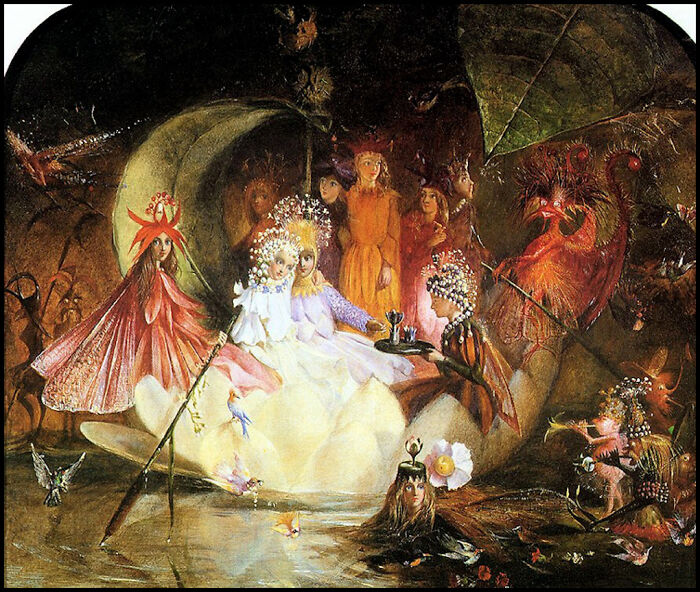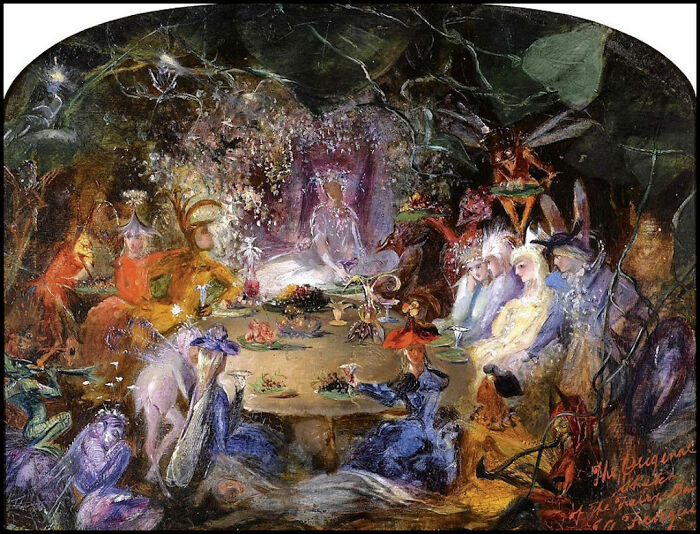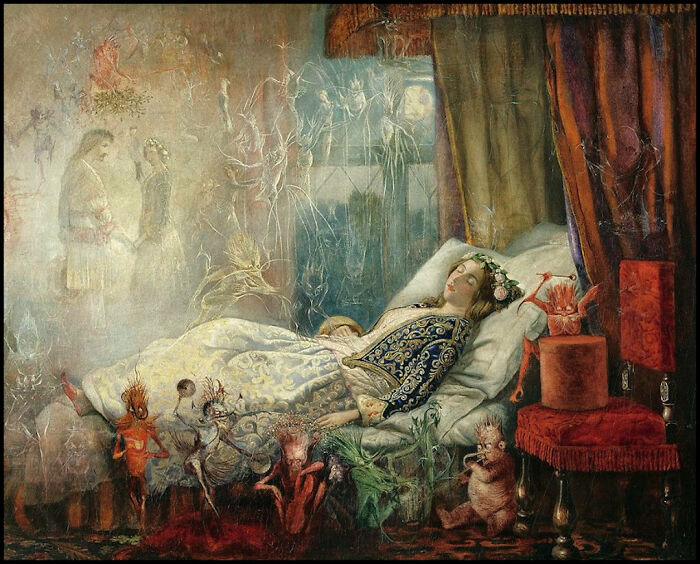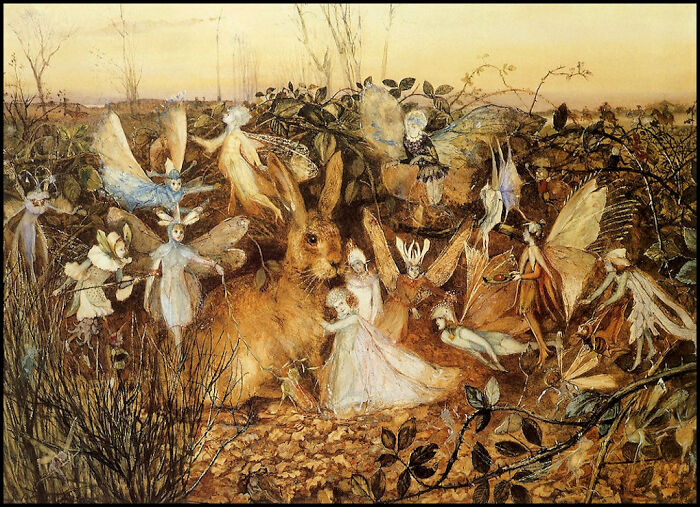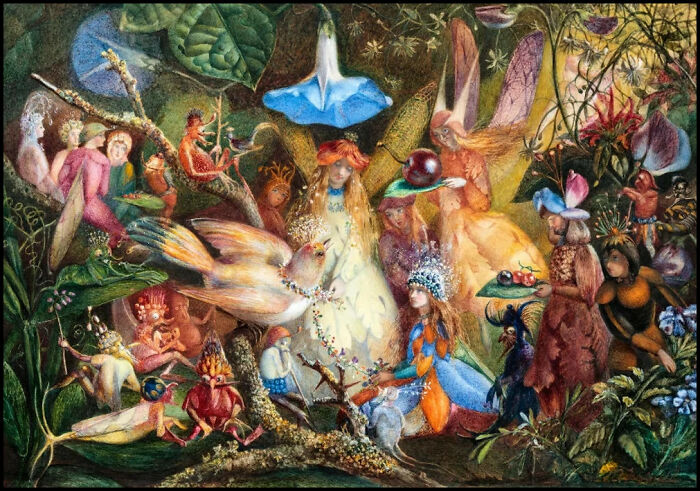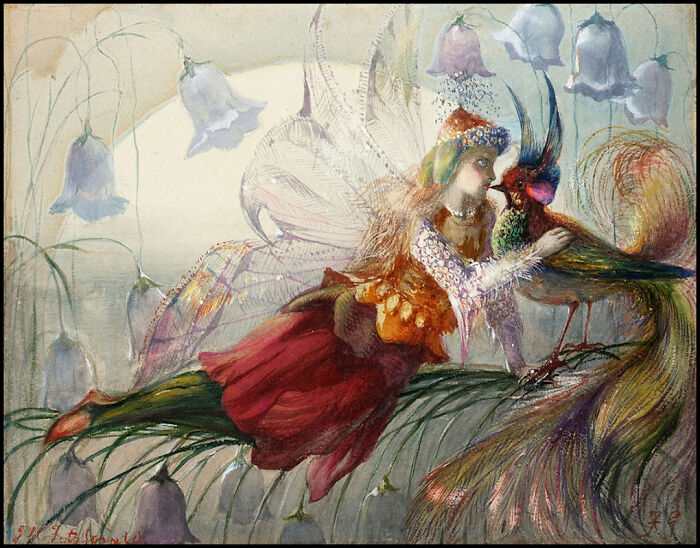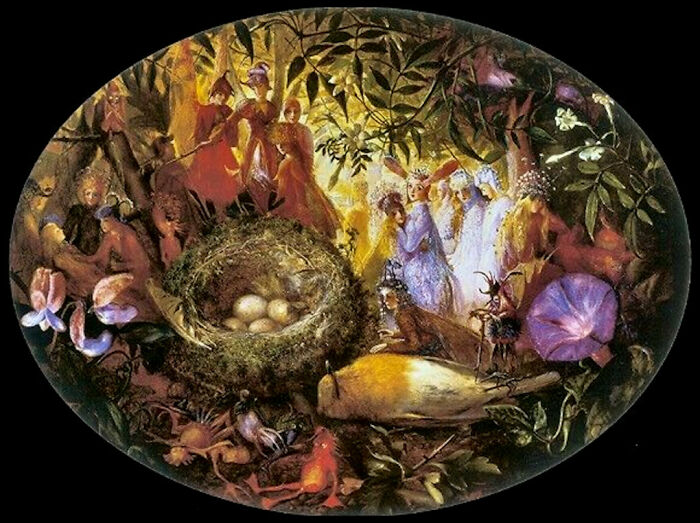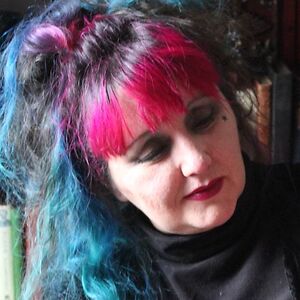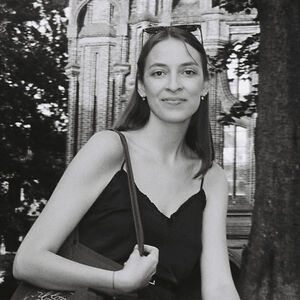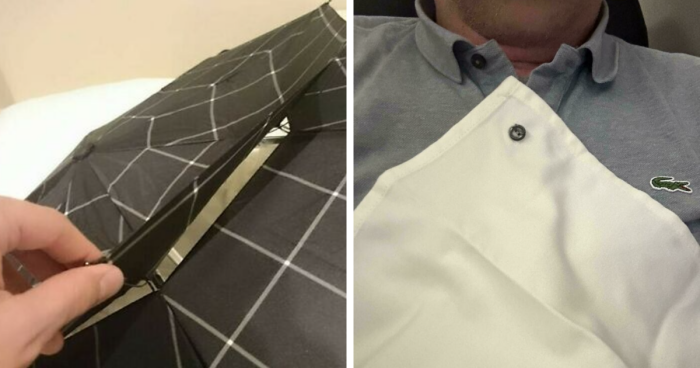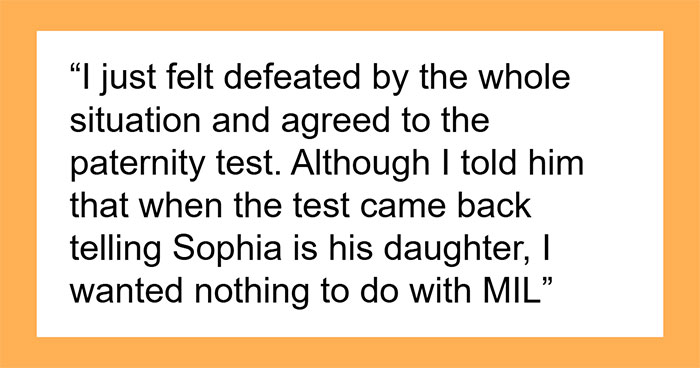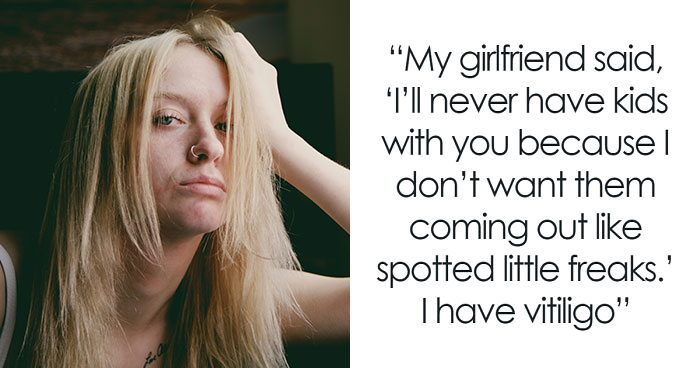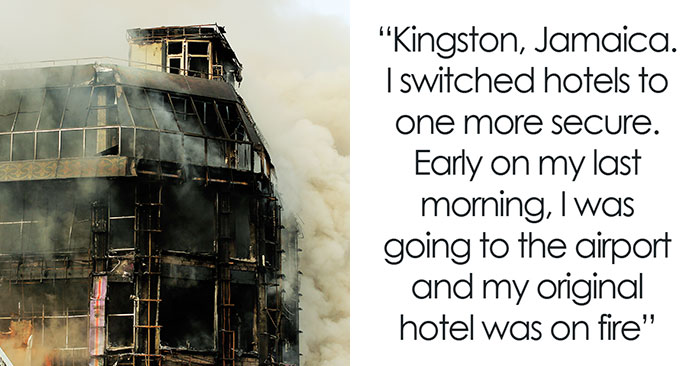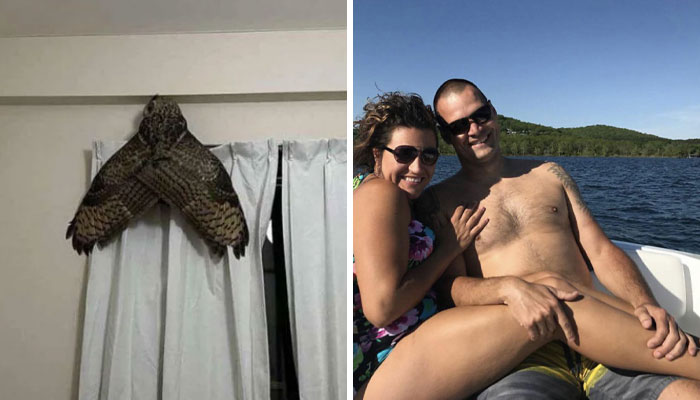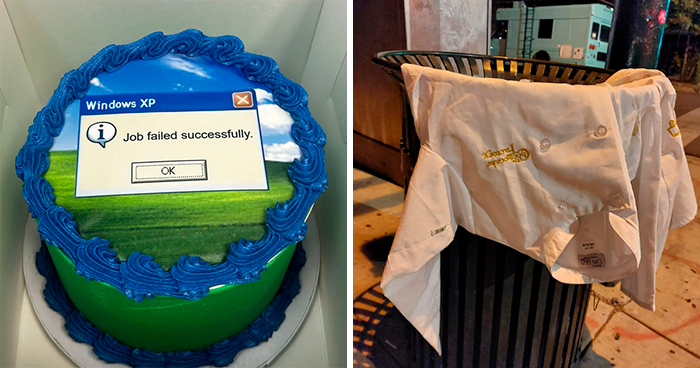In the world of fairy art there are so many images from history we are familiar with, from sweet flower fairies to darker images of elemental beings that are almost nightmarish to the imagination. One of the most popular Victorian fairy painters, one of my personal favorites, and one who blended stunning natural history art with the otherworldly 'unnatural' history was the self-taught artist John Anster Fitzgerald, so associated with Victorian fairy art that his nickname was "Fairy Fitzgerald".
Born in Lambeth, London, with a rather "fluid" official birth date, he was the son of poet William Thomas Fitzgerald. His Irish ancestry lent further fairy fascination to his life, Ireland and Eire both being countries of so much fairy folklore and legend. He married in 1849 and he and his wife, Mary, created a home with four sons and two daughters. His youngest daughter, Florence, no doubt inspired by her father, also became an artist and sculptor.
During his lifetime as a professional artist, he exhibited at the Royal Academy of Arts in London, in 1845; also at the British Institution, the Society of British Artists, and the Royal Watercolour Society. The popular newspaper, and world's first news magazine, 'The Illustrated London News' commissioned Fitzgerald to illustrate a collection of Christmas fairies that appeared regularly in their festive editions. Often his original paintings would be renamed by galleries as his own titles were a little vague in relation to the subject of the paintings and so there has always been confusion and contradiction in the history of the artwork of Fitzgerald.
More info: youtube.com
This post may include affiliate links.
Fairies In A Bird's Nest
Of course, as a painter of these dual-natured elemental beings, his work gives not just a nod to the ethereal pretty worlds the Good Folk live in, but also many have a sinister atmosphere of darkness, of beautiful nightmares both surreal and intoxicating.... and sometimes with a nod to the common use of drugs in the Victorian era, not just the casual use of laudanum and opiates, but also the Opium dens of London so frequented by all classes of society.
The fairy paintings of Fitzgerald are jewel-like, surreal, sometimes eerie or downright creepy, and yet always with an ethereal beauty. Strange Bosch-like shaped goblins and wicked-faced pixies cavort with pretty fairy females and males; birds are held captive by these otherworldly creatures; small animals hunted or cared for... and the intoxicated dreams of sleeping human men and women are haunted by the images of these peculiar beings. The intense and brilliant colors sometimes used- vivid reds, purples, and blues bring a shocking brightness to many paintings, colors picked straight from the flower garden. Other works have a subtle palette that almost drifts mist-like over the canvas.
Fairies Looking Through A Gothic Arch
Fairy Hordes Attacking A Bat
The artworks can be both captivating and inspirational and juxtaposed with a sinister atmosphere. These small beings are alive in our human landscapes, or peeking through our windows... and yet we cannot see them ourselves in their or our reality.
Although he rarely used literary inspiration for his work one of the few rhymes he did use as inspiration was that of 'Who Killed Cock Robin'. The great majority of his work though was from his own imagination and most probably also inspired by his Irish ancestry with its acceptance of the fairy folk. In 1902 Fitzgerald exhibited his last painting, and this was at the Royal Academy, an image of Alice in Wonderland.
Sea Sprites In Flight
The Fairy's Barque
In his personal life, he was a very private man, somewhat reclusive, not comfortable mixing with other artists, usually relaxing every Saturday at 'The Savage Club', a very popular gentlemen's club found in London, and yet he was known by friends to be a keen mimic of the popular actors and personalities of the day. In fact, he loved his time at the Savage Club so much that he was known to have mentioned he wished he could die there. Sadly he passed away at the age of 87 in 1906 only a few days before it would come to his next much-awaited Saturday visit to the club.
The Fairies' Banquet
The Stuff That Dreams Are Made Of
There is a peculiar postscript to the story of the art of Anster Fitzgerald. In the late 20th century a fascinating case came to light of a self-taught painter who had created forgeries of Anster Fitzgerald's art. Robert Thwaites, who specialized in Victorian-era forgeries, forged Fitzgerald's work as part of his wider crimes. One, 'The Miser', sold for £20,000. Another, 'Going to the Masked Ball', was sold to a major London gallery owner and collector for over £100,000 although suspicion was already aroused regarding this painting. On the 3rd attempt to sell a Fitzgerald forgery, 'Poppy with Imps and Fairies', the collector became suspicious and both Thwaites and his brother were arrested and charged, along with a friend who had aided and abetted in the crimes. In court, Thwaites claimed his failing eyesight had forced him to resort to a life of art forgery to pay his debts and son's private school fees. On investigation experts in Victorian era painting had noticed the pigments used were modern and the brush strokes incorrect for the artwork of Fitzgerald. Although found guilty and sentenced even the judge acknowledged Thwaite's talent as an artist. During the initial police search of Thwaites's home during an investigation a book was found.... the title... The Art Forger's Handbook!
Who knows what Anster Fitzgerald would have made of this strange epitaph to his story, but one thing we do know is that in the world of fantasy artwork, he is still to this day a huge inspiration to those who create work in the Fairy genre.
Rabbit Among The Fairies
The Fairy's Favourite
The Realms Of Fairydom
Who Killed Cock Robin
Thank you so much for taking the time to write and share this wonderful artist's presentation with us. It's wonderful discovering a new artist, especially one who worked on such a dear to my heart subject and whose style reminds me of another favorite artist, Bosch. Thank you very much 🖤
Thank you so much for taking the time to write and share this wonderful artist's presentation with us. It's wonderful discovering a new artist, especially one who worked on such a dear to my heart subject and whose style reminds me of another favorite artist, Bosch. Thank you very much 🖤

 Dark Mode
Dark Mode 

 No fees, cancel anytime
No fees, cancel anytime 


